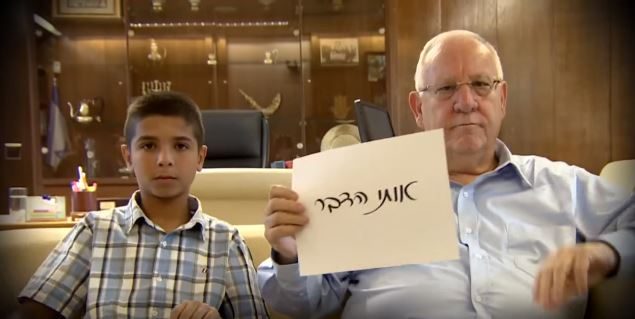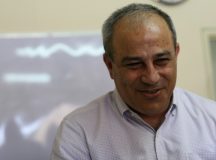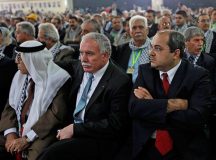Mike Prashker, author of a forthcoming book, A Place for Us All – Social Cohesion and The Future of Israel, argues that healthier social cohesion based on shared citizenship is now an existential need for Israel. In the past Israel’s tribes were far smaller, inward-looking, and insulated; friction was consequently limited. In 2016, however, 8.5 million Israelis happily aspire to first-class citizenship; the mythical campfire of old is unprecedentedly crowded, unruly, and competitive as Israel’s tribes collide as never before. This is a promising but perilous moment in Israel’s democratic journey. Historically, educationally, socially, and psychologically ill-equipped for this moment, Israel finds itself is at a fateful crossroads between tribal fragmentation and civic accommodation.
Israel is performing well on many important international measures such as GDP, technological innovation, life-expectancy and even happiness. But when it comes to social cohesion, it is trailing too far behind. While there are compelling explanations, a comprehensive study of social cohesion among 34 EU and Organisation for Economic Co-operation and Development (OECD) countries commissioned by the Bertelsmann Foundation in 2013 ranked Israel 28th overall and 33rd on attitudes towards diversity. These finding were echoed in a recent Pew Research Center study examining relations between Israel’s 8.5 million citizens.
Just as Israel requires an Iron Dome to protect all its citizens from external enemies, so it requires a sophisticated ‘Civic Dome’ to reinforce the fragile social threads that connect us. President Rivlin is, fortuitously, championing the issue. His ‘four tribes’ metaphor — which refers to Israel’s four separate school streams: Jewish secular, national religious, ultra-orthodox, and Arab-Palestinian — is familiar to Israelis and resonates strongly.
Encouraged by President Rivlin, the term ‘social cohesion’ is increasingly entering public discourse. I believe that it is therefore timely for a substantive discussion of the meaning of the concept, the conditions conducive to its development, and the most important principles for its promotion.
As a Jewish-Israeli, I feel privileged to live in the national homeland of the Jewish people. Precisely as such, I believe that Israel can and must be fairer to all its citizens and make every effort to live in reasonable accommodation with its neighbours. I appreciate that this is not a perspective shared by all. I make no claim to be an objective observer of Israeli society, if one even exists. I do, however, aspire to be fair, and it is in that spirit that I hope to contribute to the emerging conversation.
Meanings
In my forthcoming book, A Place for Us All – Social Cohesion and The Future of Israel, I propose this definition of social cohesion: ‘The characteristics of relations between all of a state’s citizens which offer the best prospects for a successful shared future for all citizens and major stakeholder communities.’ The definition embeds four basic properties:
Social cohesion should be used to describe relations between allcitizens of a state. In Israel’s public discourse, ‘social cohesion’ is frequently used to discuss relations among Israel’s 80 per cent Jewish majority while ignoring the 20 per cent Arab-Palestinian minority.
In today’s world the possession of citizenship in a functioning state matters enormously; anyone doubting this need just listen to those who lack it. But there can be a chasm between ‘being’ and ‘feeling’ a citizen. Bridging that chasm requires clarification of the intimate relationship between ‘social cohesion’ and ‘shared citizenship’. In short, healthier social cohesion is the goal while more meaningful shared citizenship is the means.
Social cohesion must take into account other ‘stakeholder communities’ who are not themselves citizens. In Israel’s case, non-Israeli Jews and non-Israeli Palestinians are the two major stakeholder communities. It is unrealistic to imagine that the levels of cohesion in Israeli society could ever be independent of the feelings and fortunes of these communities. Even in the preferred scenario of a two-state solution, relations with neighboring non-citizen stakeholder communities will always impact Israel’s social cohesion.
Healthy levels of social cohesion can be imagined as existing between two distinct dangers: disintegration when cohesion drops too low (think Syria) and tyranny when it is too high (think North Korea). Tellingly, in Hebrew the root of the word for cohesion (lechidut) is the same as the word for trapped (lechudim), illustrating the danger that over-reaching efforts to build cohesion can mutate into coercion. Maintaining healthy levels of social cohesion is a never-ending task rather than a destination.
Conditions
There are five conditions which are conducive to healthy levels of social cohesion, grounded in shared citizenship.
A mature democratic culture. Some believe Israeli democracy to be in freefall from some early peak, manifested by increasingly antagonistic intergroup relations. While I do not accept this assessment, I agree that Israeli democracy and society are in crisis and at great risk of succumbing to divisive tribal forces. While establishing impressive democratic institutions from the start, Israel never (quite understandably) possessed a mature democratic culture. Israel is, in fact, better understood as an ‘adolescent’ democracy. Like adolescents, adolescent democracies do not do nuance: they take sides, shun compromise, test limits, and rarely apologise. Yes, Israel’s early decades were characterised by greater harmony, but this was primarily due to the hegemony of one tribe and the preoccupation of the others in rebuilding their shattered communities. Back then, Israel’s tribes were far smaller, inward-looking, and insulated; friction was consequently limited. In 2016, however, 8.5 million Israelis are, thankfully, aspiring to first-class citizenship; the mythical campfire of old is unprecedentedly crowded, unruly, and competitive, as Israel’s tribes collide as never before. This should be seen as a positive but perilous stage in Israel’s democratic journey. Historically, educationally, socially, and psychologically unequipped, Israeli society finds itself at a fateful crossroads between tribal fragmentation and civic accommodation.
Agreed borders are a defining characteristic of the modern state. There are many international border disputes which have little or no strategic impact on social cohesion, but in Israel’s case the dispute directly affects social cohesion between Israelis, and between Israelis and the major non-citizen stakeholder communities.
Prosperity and reduced economic gaps. The Bertelsmann study concluded that along with relative prosperity, lower levels of income inequality promote social cohesion. According to the 2015 OECD income inequality indicator, Israel has the fourth highest level of income inequality, just behind the United States, Turkey, and Mexico. The alignment of tribal divides with pronounced socioeconomic gaps places additional strain on the social fabric.
Trust in the state. Levels of trust in the state are closely related to perceptions of discrimination and corruption. As well as widening the socioeconomic gap, discrimination erodes trust between groups of citizens and between these groups and the state, as well as undermining feelings of civic belonging. Discrimination eats away at a basic appreciation of the moral and pragmatic value of formally shared citizenship.
Trust in the Other and civic belonging. In his widely quoted address to the 15th Annual Herzliya Conference on 7 June 2015, President Rivlin stated that: ‘A child from Beth El, a child from Rahat, a child from Herzliya and a child from Beitar Ilit — not only do they not meet each other, but they are educated toward a totally different outlook regarding the basic values and desired character of the State of Israel.’ After twenty years of conversations with Israelis of all backgrounds, I have become all too aware of the low levels of inter-group familiarity and the high levels of fear. Ironically, I am yet to meet any Israeli who feels that they threaten ‘other’ Israelis; yet all feel threatened.
Twenty years after the assassination of Prime Minister Yitzhak Rabin, when there was a similarly uncivil public and political environment and unprecedented tribal friction, the risks should not be underestimated. But given the historical trajectory of Israeli society, there is also no reason for despondency. The current crisis is indicative of what was bound to be hard won progress on Israel’s tough democratic journey towards healthier social cohesion rather than evidence of terminal decline.
Principles for Promoting Social Cohesion
Taking citizenship seriously. The establishment of Israeli citizenship as a new political identity was one of the most basic achievements of Zionism. But 68 years on, confusion reigns at every level about who Israelis actually are. Not surprisingly, with the term ‘Israeli’ often used interchangeably with ‘Jewish’, Arab-Palestinian-Israelis frequently feel excluded. Similarly, we often say ‘Israelis and Russians’ or ‘Israelis and Ethiopians’ when we mean ‘veteran and immigrant Israelis’. While Israeli citizenship — like citizenship everywhere — has yet to deliver on its promise for many Israelis, it is the only common foundation on which to build.
Precisely because of Israel’s definition as the national homeland of the Jewish people, we need to work especially hard (and sensitively) to promote what I call full ‘symbolic’ belonging for all Israelis. (By ‘symbolic’ I mean those intangible aspects of belonging such as dignity, recognition, and respect; this is in contrast to the ‘material’ aspects of belonging such as infrastructure, housing, and wheelchair access.) Despite the understandable scepticism of many Arab-Palestinian-Israelis, it is entirely possible to provide a far greater sense of symbolic belonging to all Israelis, but this requires, together with equal material opportunities, the development of a mature democratic culture that truly respects diversity and accommodates disagreement.
Acknowledging cross-cutting identities and appreciating interconnectivity. As humans, we all possess countless identities; in reality, no Israeli belongs to a single tribe. But this welcome complexity tends to get lost in competitive tribalism and harsh binary divides: right and left, Jews and Arabs, religious and secular. We need to transcend this tendency by promoting shared identities, values, and interests by means of a consensual civic language. At the same time, we should not threaten our particular identities — meaningful social cohesion is never brewed in melting pots.
The power of partnerships. Social cohesion requires partnerships between sectors (government, civil society, and, where appropriate, business) and between tribes. In the most cohesive societies, government forges a close partnership with civil society. This partnership, so critical to scalability and sustainability, must be prioritised in Israel today. Civil society can lead by piloting new partnerships of trust and cooperation between Israel’s most estranged communities. High unemployment levels, for example, in the Arab-Palestinian, ultra-orthodox, and Ethiopian communities have many shared causes that can be more effectively and economically addressed with collaborative responses that also bolster social cohesion.
Scaling whatever works. Interventions that prove effective should be scaled up. Too many successful initiatives in education and employment are set aside prematurely. To paraphrase an incisive saying; too many good things never happen because the people doing them give up too quickly.
Current levels of state funding are grossly inadequate for the construction of the ‘Civic Dome’ that Israeli society needs. Given the strong tribal forces dominating Israeli politics, cross-cutting support for necessary levels of state funding is required to bring about change. Civil society, less constrained than elected leaders by tribal pressures, should play a key role in aligning this support and securing the necessary state budgets.
Conclusion
The growing attention of significant elements of civil society to the issue of social cohesion is a welcome development. This does not release Israel’s governments from their solemn responsibilities to its promotion. Indeed, Israel’s journey towards more mature democracy and healthier levels of social cohesion can only be driven by increasingly engaged citizens and stakeholders who — organised through civil society — take ever greater responsibility.
Given Israel’s remarkable history, I am confident that if Israelis, and all who care about Israel’s future, work to promote healthier levels of social cohesion as determinedly and creatively as former generations worked on state-building, the results will be spectacular.




































